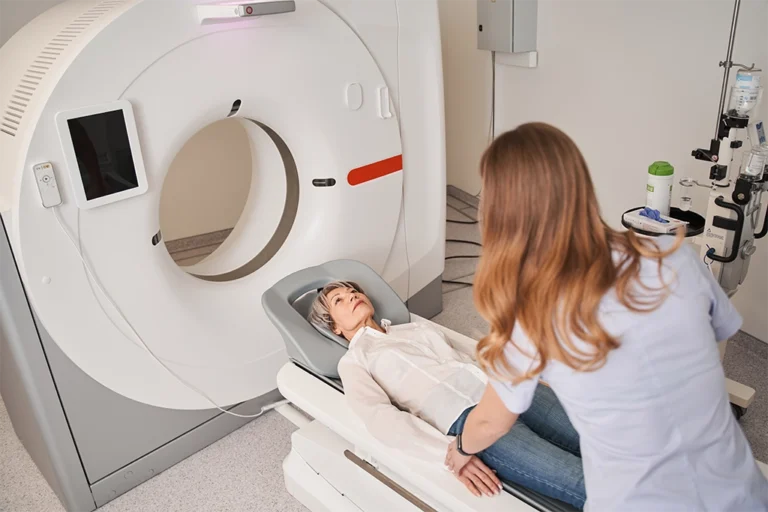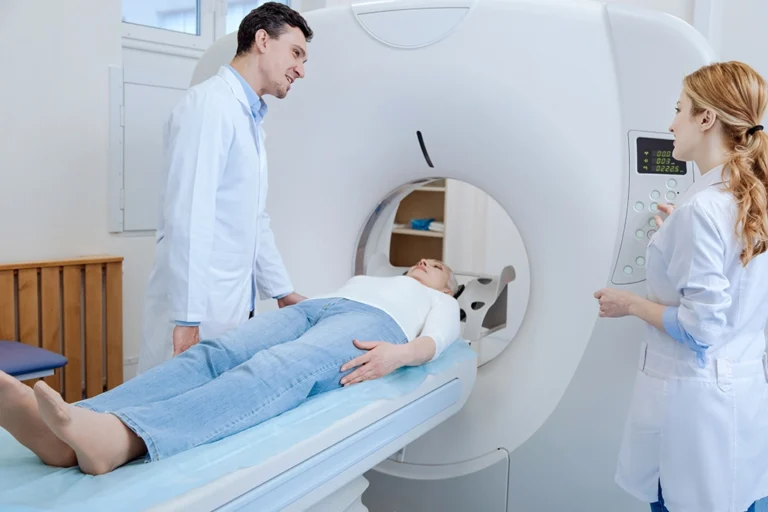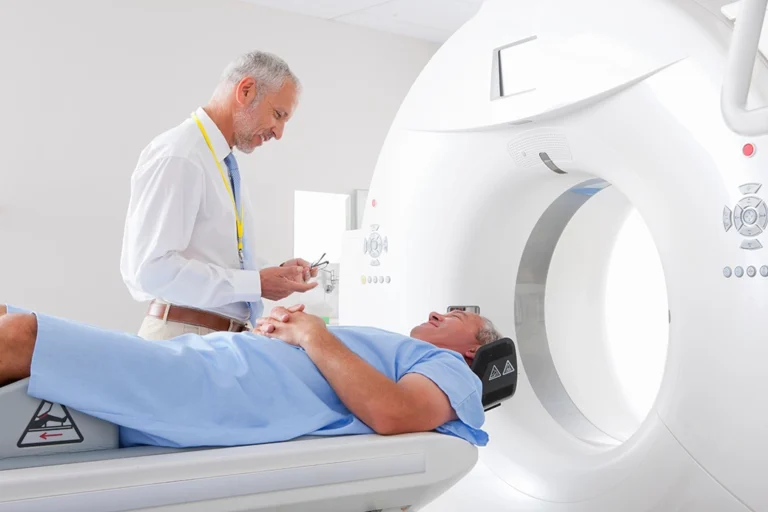When your healthcare provider recommends a CT scan instead of an MRI scan, it’s likely because they believe it will give them the most useful information for understanding your condition. Sometimes, your provider might order a CT scan before they order an MRI, depending on your health history and what they want to image.
Doctors do not necessarily prefer one scan over the other: each scan has its own benefits, so your doctor will consider your personal situation before deciding which scan they recommend.
In this guide, we’ll let you know more about why your provider would order a CT scan instead of an MRI, including how the two scans compare, why CT is sometimes preferred, and what makes a CT scan quicker and more comfortable than an MRI. Let’s take a closer look.
Comparing CT scans and MRI scans
Both a CT scan and an MRI scan are excellent diagnostic tools, but they work in different ways, and provide different types of images. Understanding these differences can help you feel more informed and confident about your upcoming scan.
How does a CT scan create detailed images? How does an MRI work?
A CT scan uses a combination of X-ray technology and computer processing to create detailed cross-sectional images of your body. The CT machine rotates around you, capturing multiple X-ray images from different angles.
These images are then processed by a computer to produce highly detailed images of the inside of your body. CT scans are particularly good at capturing images of bones, blood vessels, and soft tissues.
On the other hand, an MRI scan uses powerful magnets and radio waves instead of X-rays to produce images. When you’re inside the MRI machine, the magnetic field temporarily aligns the protons in your body, and the machine then sends out radio waves to measure how these protons respond.
The information gathered is turned into detailed images of your body’s soft tissues, like muscles, organs, and the brain. MRI is especially effective for examining soft tissues in the body but doesn’t show bone structure as clearly as a CT scan.
How is a CT scan different from an MRI scan?
CT scans are faster and are often used in emergency situations where a quick diagnosis is necessary, such as detecting internal bleeding or fractures. In contrast, MRI scans are more detailed when it comes to soft tissues like muscles, nerves, and organs, but they take longer to complete and may not be suitable for urgent situations.
Another difference is that MRI machines use strong magnetic fields, so if you have metal implants or devices in your body, an MRI might not be an option. CT scans don’t have this limitation, which makes them more helpful for imaging some patients.
What is a CT scan better at showing than an MRI?
CT scans are particularly good at showing bone fractures, bleeding in the brain, and certain types of cancers, especially when they affect the bone or lungs. They are also better at quickly detecting problems in emergency situations, where a detailed image of bone fractures, internal bleeding, or other urgent issues is needed to guide immediate treatment.
Also, CT scans are helpful for imaging the chest and abdominal areas, as they can clearly show the organs and blood vessels in these regions. While both scans are crucial for diagnosing different health issues, CT scans excel at imaging bones and certain organs.
View our available appointments at a location near you today
When CT scans are the preferred option
While both imaging techniques are valuable tools, a CT scan is often the preferred choice in certain situations. It provides detailed images quickly, and is particularly useful for diagnosing a variety of conditions.
Why would my healthcare provider choose a CT scan over an MRI scan?
One of the main reasons a healthcare provider might opt for a CT scan is its ability to provide fast and clear images of bones and soft tissues. CT scans are quicker than MRIs, which makes them ideal when immediate results are necessary, or when doctors need to make a quick diagnosis.
CT scans are also less sensitive to patient movement, which can be an issue in MRI scans, especially if the patient is in pain or cannot remain still for an extended period. In addition, CT scans are often the first choice for imaging certain areas of the body, like the chest, abdomen, and pelvis, as they offer detailed views of bones, organs, and blood vessels.
What types of conditions are best detected with a CT scan?
CT scans are particularly effective at detecting a wide range of conditions related to bones, blood vessels, and certain soft tissues, including fractures, tumors, internal bleeding, and infections. They can also provide detailed images of the lungs, liver, pancreas, and kidneys, helping doctors diagnose issues like lung diseases, cancers, or kidney stones.
In cases of trauma, a CT scan can quickly identify internal injuries, including bleeding or organ damage that may not be immediately visible. This makes CT scans essential for evaluating a variety of conditions and guiding further treatment decisions.
How do CT scans help detect injuries or trauma?
Injury or trauma, especially when there is a possibility of broken bones or internal bleeding, is one of the most common reasons a CT scan might be ordered. Whether it’s a car accident, a fall, or another form of trauma, a CT scan can quickly reveal fractures, dislocations, or internal damage to organs and blood vessels.
In situations where rapid decision-making is required, CT scans can provide a detailed and immediate assessment, helping healthcare providers determine the extent of the damage and plan the necessary interventions.
How can a CT scan help to diagnose heart and lung conditions?
For the heart, a CT scan can help detect coronary artery disease, assess the heart’s structure, and identify potential blockages or issues with blood flow. In cases of suspected heart disease, a CT scan can provide a clear and detailed image of the coronary arteries, which helps doctors plan the best course of action.
When it comes to lung conditions, CT scans can help detect issues like lung cancer, pneumonia, pulmonary embolism, and COPD. The high resolution of a CT scan allows healthcare providers to see even small changes in lung tissue, making it an effective tool for diagnosing a variety of respiratory conditions.

The speed and comfort of a CT scan
For many conditions, the sooner your healthcare provider can identify the issue, the sooner you can begin treatment. A lot of people find the experience of getting a CT to be a little more comfortable than getting an MRI, which can be important for people with certain conditions, including claustrophobia.
How long does a CT scan take? Is a CT faster than an MRI scan?
A CT scan typically takes just a few minutes to complete, with the actual imaging portion usually lasting no more than 5 to 10 minutes. In comparison, MRI scans usually take longer, often requiring 30 to 60 minutes or longer to complete. This is especially important when time is a factor in your diagnosis and treatment.
If I’m claustrophobic, why would my doctor recommend a CT scan?
If you experience claustrophobia or anxiety in confined spaces, a CT scan may be a more comfortable option than an MRI. Unlike MRI machines, which are large and tube-like, CT scanners are often more open and spacious, reducing the feeling of confinement.
This can make the process much more manageable for individuals who struggle with claustrophobia. The CT machine is designed to allow you to lie down and be positioned within the scanner, but it doesn’t enclose your entire body in a narrow tube, which can be a relief for those who are sensitive to tight spaces.
After my scan, how long will it take to get my CT results?
The good news is that CT scans offer rapid results, which are often available shortly after the procedure. Since the images are processed quickly, your healthcare provider can usually review them soon after your scan.
Your healthcare provider will discuss the findings with you as soon as they are available, which helps you move forward with your care, without unnecessary delays. That’s why CT scans can play a big part to ensure you get the best available care.
How to schedule an appointment with us
Our goal is to offer you and your healthcare provider the most informative results possible, and we make it easy for you to get an appointment.
With numerous locations across South Jersey, you’ll find us conveniently located near major highways and key bridges in the region.
We’ll ensure the entire scheduling process is as effortless as possible for you. Above all, we are here to help you.
Reach out to us at any of the following locations to book an appointment:
- Haddonfield Office – Haddonfield, NJ
- Marlton (Greentree) Office – Marlton, NJ
- Moorestown Office – Moorestown, NJ
- Mount Laurel Office – Mount Laurel, NJ
- Route 73 (Voorhees) – Voorhees Township, NJ
- Sewell (Washington Township) Office – Sewell, NJ
- Voorhees (Carnie Boulevard Office) – Voorhees Township, NJ
- West Deptford Office – West Deptford, NJ
- Willingboro Office – Willingboro, NJ
Learn more about the board-certified, subspecialized radiologists who read, analyze and interpret the findings here at South Jersey Radiology Associates.
Frequently Asked Questions
A CT scan uses X-rays to create detailed images of the body, while an MRI uses magnetic fields and radio waves to produce images, often with higher resolution for soft tissue.
A CT scan takes multiple X-ray images from different angles and combines them to create cross-sectional images of the body.
CT scans are particularly effective for detecting bone fractures, cancer, internal bleeding, and certain lung and heart conditions.
A doctor might choose a CT scan when quick results are needed or when imaging bones, organs, or blood vessels is a priority.
CT scans quickly reveal fractures, internal bleeding, and other traumatic injuries, making them ideal for emergency situations.
CT scans can provide detailed images of the heart and lungs, helping diagnose issues like pulmonary embolism, coronary artery disease, and lung cancer.
A CT scan usually takes only a few minutes, making it much faster than an MRI, which can take 30 minutes to an hour.
CT scans are less confining than MRIs, with a shorter and wider tunnel, making them a better choice for patients with claustrophobia.



